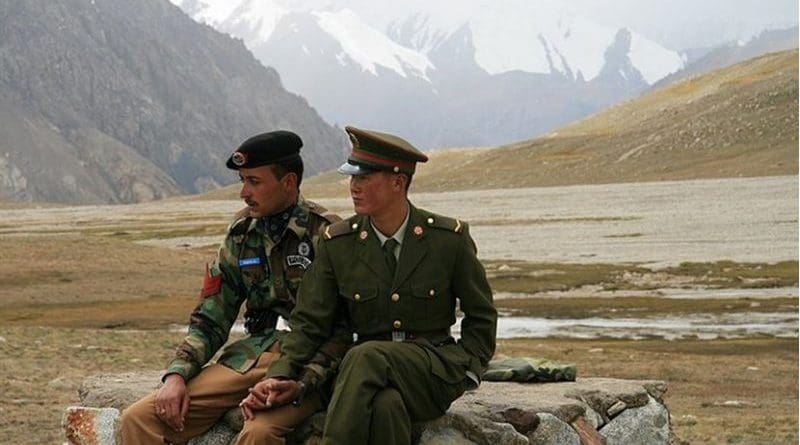Indian Official Backs Army Chief’s ‘Proxy Game’ Comments On Pakistan, China
By BenarNews
By Jhumur Deb and Akash Vashishtha
An Indian government official on Monday defended the army chief’s controversial assertion that Pakistan and China were engineering an influx of Bangladeshis into India’s northeast to destabilize the country.
Army Chief of Staff Gen. Bipin Rawat caused a stir last week when he suggested that Pakistan, with support from China – India’s other main rival – were playing a “proxy game” to send Bangladeshi immigrants into its northeastern states. Some of these states share borders with Bangladesh.
“It is beyond our domain to comment on the army chief’s statement, but he obviously wouldn’t have said such a thing without substantial evidence,” an official with India’s Home Ministry told BenarNews on condition of anonymity.
In a speech at a seminar in New Delhi about securing India’s borders in the northeast, Gen. Rawat pointed to what he said were two factors driving immigration into that region from Bangladesh.
“One is they are running short of space. Large parts of [Bangladesh] get flooded during monsoons. And the other issue is a planned immigration that is taking place because of our neighbors,” Rawat said, according to a transcript of his Feb. 21 speech. “They will always try and ensure that this area is taken over, playing the proxy dimension of warfare.”
“You don’t have to confront a stronger nation through conventional operations. So you play a proxy game. This proxy game is very well played by our western neighbor, supported also by our northern neighbor,” Rawat said, referring to Pakistan and China but not by name.
The general did not explain how China and Pakistan – Bangladesh’s longtime enemy from which it broke free through a war of independence in 1971 – could engineer such a mass migration as part of a proxy war.
On Monday, a spokesman for the Indian army declined to answer questions from BenarNews seeking clarification.
“We cannot comment on his statement. But whatever he said, he said it absolutely clearly,” said the army official, who asked to be kept anonymous.
Gen. Rawat’s made the comments as India’s Hindu nationalist-led government was moving to deport an estimated 20 million Bangladeshi-origin Muslims who had migrated to India illegally since the birth of Bangladesh in 1971. The final draft of a National Register of Citizens (NRC), which aims to identify and deport them, is to be submitted to the Supreme Court before June 30.
For years, the northeastern Indian states of Arunachal Pradesh, Assam, Manipur, Meghalaya, Mizoram, Nagaland, Sikkim and Tripura have struggled to contain armed groups demanding sovereignty from Hindu-majority India, which shares more than 2,000 miles of its border with Bangladesh and China.
“People have infiltrated from Bangladesh to reside in Assam, Tripura and Mizoram. Besides, such migrants exist in huge numbers in West Bengal [and] who came during the 1971 war,” the home ministry official said, adding that Bangladeshi immigrants had also settled in states such as Uttar Pradesh, Bihar, Jharkhand, Maharashtra and Andhra Pradesh.
‘Important aspect of national security’
Prime Minister Narendra Modi’s government, headed by his Bharatiya Janata Party (BJP), won state elections in Assam in 2016 on a pledge of deporting Bangladeshi migrants from the state.
A BJP spokesman praised the army chief for commenting on an “important aspect of national security.”
“It is only natural that the socio-political, demographic, cultural aspects should be discussed. In fact, the army should be saluted for his talk,” party spokesman Sambit Patra told a television news channel.
But the All India United Democratic Front (AIUDF), a political party fighting for the Muslim minority in Assam, slammed Rawat’s comments, describing them as unbecoming of the nation’s top army official.
“If there is a possibility of Pakistan trying to push in illegal migrants, the defense ministry should take steps to stem this. We don’t understand why Rawat made such a comment,” AIUDF President Haider Hussain Bora told BenarNews. “It seems he wants to join politics. From his comments, it seems like he was trying to please people to win a political post.”
‘Zero proof’
Analysts, meanwhile, took differing views on the general’s speech.
“[Rawat’s] claim is not only based on sound intelligence, but also experienced through practice. Pakistan and Bangladesh might historically be antagonists, but Pakistan’s ISI [Inter-Services Intelligence] and other groups are sponsoring Bangladeshi extremists groups and elements to circulate fake currency and wage terror activities in India,” Dushyant Nagar, a Delhi-based political and strategic affairs analyst, told BenarNews.
“China has, in fact, been aiding Pakistan in this proxy war. China’s only aim is to encourage the anti-India sentiment in the northeastern states so that it has an edge in case of a military confrontation,” he said.
Bharat Karnad, a foreign policy analyst at New Delhi’s Centre for Policy Research, agreed.
“[It is] no secret. They [Pakistan and China] are hand-in-glove in waging this proxy warfare against India and they have been doing this for the last 25 years. It is high time that an Indian official came out openly about it,” he told BenarNews.
However, another security analyst criticized Rawat for what he described as over-the-top allegations by the general.
“The army chief or anyone else has zero proof that Pakistan and China were masterminding the alleged influx … the entire Bangladesh border is fenced and patrolled, and if he has questions on its porosity, he would do well to take it up officially with the Border Security Force and Ministry of Home Affairs,” Bangladesh’s Daily Star newspaper quoted Manoj Joshi, a fellow at the New Delhi-based Observer Research Foundation.
*Rohit Wadhwaney in New Delhi contributed to this report.

